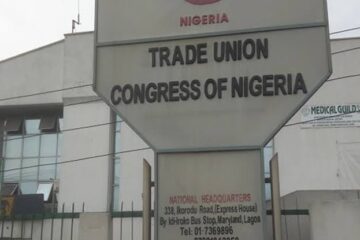About N500 billion lost to Anchor Borrowers’ Programme – Stakeholders

Farmers
Stakeholders in the agriculture space have called for a total overhaul of the Central Bank of Nigeria’s agriculture flagship programme, Anchor Borrowers’ Programme even as the rate of default remains a subject of disagreement.
This comes as the apex bank and participating financial institutions may have lost about half of N1.09 trillion said to have been disbursed to farmers through the scheme.
The International Monetary Fund had revealed that only 24 per cent of the amount disbursed had been repaid. But the CBN pushed back, saying about 52.4 per cent or N503 billion had been recovered from the 4.5 million beneficiaries.
The suspended governor of the Bank, Godwin Emefiele, had disclosed that N1.09 trillion had been disbursed through the controversial programme.
Despite the loss, stakeholders described the intention of the scheme as noble, but called for the restructuring of the implementation and involvement of public agencies in the agro-ecosystem to minimise the risks and increase performance level.
The Chief Executive Officer of Kereksuk Rice Farms, Rotimi Williams, said though the programme had not been successful, a restructuring could increase its efficiency.
“The measurement of success should be a reflection of the price of a commodity in the market and in the past five years. What we have experienced is persistent increase in the price of rice across markets, coupled with an increase in smuggling activity, signally a supply gap in the market. This is the true signal of either success or failure. At this point, it is safe to say that Nigeria’s money was wasted.
“This is the primary reason why the repayment levels are low: the funds were not approved based on merit and the recipients do not feel the need to pay back following the huge kickbacks given.
“To quantify this based on the N1.4 trillion, a total kickback of N280 billion was enjoyed by the approving authority within the bank,” he alleged.
Williams hinted that he attempted to access the fund for his farm, but did not succeed even when his farm was considered one of the largest in the country, and perhaps the largest rice farm.
On whether the programme should continue under new management of the apex bank, Williams said: “I honestly believe that the ABP was developed with clear intentions and if the funds were disbursed on merit, the impact would have been immense. Its failure is down to the greed of the approving authorities and the negligence of the banks that accepted questionable collaterals.
“I believe that with minor adjustments, the impact could be positive, but with over N1 trillion disbursed and potentially lost, I am not sure the government will have the appetite to continue.”
The President of the Yam Farmers and Marketers Association of Nigeria, Prof. Simon Irtwange, said that even though yam was mentioned among the agricultural commodities covered under the programme, efforts made by the association to access the loans did not yield results.
He said: “As an association, we followed the due process to ensure our members benefited from the programme. But we were rather harassed by the NIRSAL, the microfinance bank disbursing the loan.”
He said the programme, from the onset, was designed to favour a few individuals.
“If the government wanted to drive such programmes, it needed to ensure that it was done with adequate engagement with commodity associations,” he alleged.
President of the All Farmers Association of Nigeria, Kabir Ibrahim, claimed he knew the programme would have problems when the CBN started dealing with individual farmers directly rather than through their associations.
He explained, “Many of the farmers were reached directly not through AFAN and so when they couldn’t pay, there was no way they could be reached. So far the exposure of CBN is over one trillion and the repayment has been abysmal. For that, Nigeria has lost a lot of resources on the ABP.”
While acknowledging that Nigeria has made some gains through the ABP, Ibrahim added: “Nobody will deny the fact that there may be some rice in the country, they have even done some pyramids even though they were questionable. What we should do is institutionalize the ABP of the CBN in the Federal Ministry of Agriculture and Rural Development and they should reach the commodity associations through AFAN, which is the umbrella body.
“In AFAN, anybody who says he has a farm, we will know if it is true or not because we have leadership in every ward in this country. So that if you say you are cultivating rice, we go and check if rice can grow in that area. That is how to check the incidence of fake farmers,” he said.
He advised that the CBN should strengthen the Bank of Agriculture by paying its equity there so that the bank would be recapitalised.
“The shares of BOA should be sold to farmers so that farmers are core owners,” he said, adding that it will make the farmers know that when they are given a loan they should pay for others to get.
He also recommended that commodities to be intervened in should be spread across the six geopolitical zones, focusing on the dominant staples in each zone.
The Chief Executive of the Centre for the Promotion of Private Enterprise, Dr. Muda Yusuf, said there was a need for a proper review, a very comprehensive review of the ABP, especially from the point of the high default rate.
According to him: “If you have a credit scheme with a high default rate, then something must be wrong with the framework. Again stakeholders have complained that the loan is going into the wrong hands, there is a need to take a second look at the transparency of the process to ensure that the targeting is right so that it gets to the hands of the right people.”
Yusuf noted that there is a need for proper regular appraisal and impact analysis of that programme.
“If you talk of ABP with the trillions already spent and we are still having this high food inflation, then there is something wrong because we are not seeing any correlation between the ABP and the affordability of food. Even the rice that they talk so much about, how affordable is the rice? So we need to check those parameters and develop more reliable metrics for measuring the performance of such programmes,” he said.
Yusuf advised that the programme should also be made to cover the entire country, not just a section of the country,” he added.
President of National Oil Palm Producers and Marketers of Nigeria, Alphonsus Inyang, noted that ABP was a well thought-out programme of the CBN that would have been able to develop agriculture leading to a very huge result in value addition, but the implementation was a problem.
His words: “Somewhere along the line, the CBN governor was carried away by politicians and they turned rice into a religion in Nigeria, that if it is not rice, they won’t give you money. No economy prospers producing only one agricultural produce.”
He said the ABP neglected the tree crops, cocoa, oil palm, rubber, cashew, coffee and coconut among others. “These are trans-generational crops that can lead to true prosperity,” he said.
“If the ABP is to prosper the economy, it has to focus on tree crops. There needs to be a tree crops development fund to form an aspect of the ABP.”
He said the idea of giving out money in the morning and expecting the farmer to bring it back in the evening will not work, “what you are doing is not development financing, but cash and carry business.”
He stressed that there is a need for money to be given to the real sector, tree crops with tenors of up to 10 years.
He argued that if there is anything that needs to be done differently with the ABP, it is that tree crops come to the front burner, especially at the CBN.











